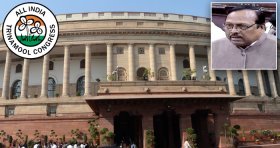March 10, 2017
Sukhendu Sekhar Roy speaks in Rajya Sabha on The Enemy (Amendment & Validation) Bill, 2016

Full Transcript
Sir, so far I understand, this Bill has been introduced by the Government following the Supreme Court judgement in a particular case that the Hon’ble Leader of the House has mentioned. We must not consider this Bill in the ambit of one case; it has wider ramifications. The 1968 Act allowed for vesting of enemy properties with the custodian after the war with China and Pakistan, as rightly pointed out by the Hon’ble Leader of the House. After the 1965 war, there were the Defence of India Act provisions, which are all right.
This Bill amends the Act to clarify that even in the following cases, these properties will continue to be vested with the custodian:
- The enemy’s death, which is all right,
- If the legal heir is an Indian, on which we have certain objections, because legally as an Indian citizen, this Bill is depriving property to Indian citizens. If there is no title after 1965, then nothing is inherited by the Indian citizen; then there is no question of putting this clause in this definition.
On the one hand, the Government is saying that after 1965 there is no title to the property by the enemy and now the Bill seeks to amend that if the legal heir is an Indian, then also he is not entitled to the title of the property. If there is no title, then how does this come? So this is contradictory, in my point of view, and so this should be removed.
Also, Sir, if the enemy changes his nationality to that of another country. Now the Hon’ble Leader of the House has mentioned about going from Pakistan to London, which is all right in that particular case. The question is, Sir, here are so many things which are not in this Bill. When Punjab and Bengal were partitioned – it was not the partition of India, it was the partition of a few districts of Bengal and Punjab only – and when millions of evacuees came from other parts of Bengal and Punjab, that is, East Pakistan and West Punjab, how much compensation has been given by the Government of India to the evacuees? Nothing has been said in this Bill about that – because the enabling provision has been made, that after the selling of the property, the custodian can sell out the property, can dispose of the property, and after the disposal where would the proceeds from the sale go, how it will be utilized, nothing has been said in the Bill. Whether, out of the sale proceeds, the evacuees or their descendants can get compensation or not; nothing has been stated.
After the emergence of Bangladesh in 1971, the evacuees of erstwhile East Pakistan got only ex gratia, not compensation, from the Government of India to the extent of 25 per cent of their total claims; therefore, 75 per cent of their total claims is still remaining.
This Bill has been brought on a piecemeal manner just to thwart the judgement delivered by the Hon’ble Supreme Court in a particular case. That is why I have objections on principle on this Bill, because if the Government is serious to take into consideration all aspects related to enemy properties then, in my view, those things should also be addressed in a proper manner, and for which a comprehensive Bill is required to be brought by the Government.
Lastly, the way the Bill has been introduced today – I cannot blame the Chair, because it is in the List of Business – I have already stated and Mr Jairam Ramesh and other Hon’ble Members have also stated the practical difficulties. This is a serious Bill which could not be discussed in a proper manner. We can understand the difficulties on the part of the Government because of the March 14 deadline. So on March 14 itself we could have discussed and passed this Bill after a threadbare discussion.
This is why, in protest against the indifferent attitude of the Government, to not to respond to the request made by the Opposition, I walk out, Sir.
